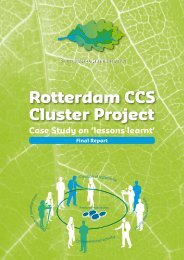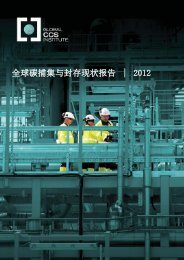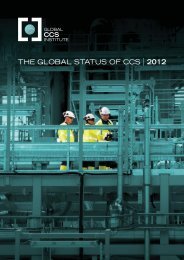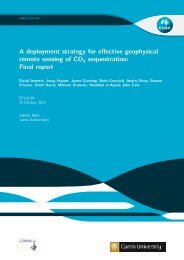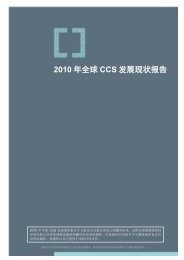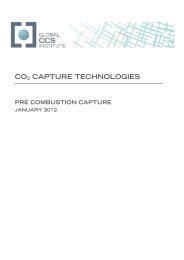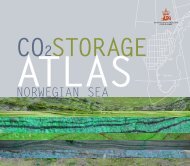Perceptions of CO2 Report - Global CCS Institute
Perceptions of CO2 Report - Global CCS Institute
Perceptions of CO2 Report - Global CCS Institute
- No tags were found...
You also want an ePaper? Increase the reach of your titles
YUMPU automatically turns print PDFs into web optimized ePapers that Google loves.
CO 2 relatedactivityInformationgatheringtopicsDemographicsNationalNGO - -0.075 ** -0.050 *LocalNGO -0.054 ** - -0.060 **Friend - - -Website - - 0.045 *UNagency 0.093 ** 0.102 ** 0.080 **Activity - - -0.066 **Nature - - -Environment - - -0.078 **Physics - - -News - -0.062 ** -Technology - - -Biology - - -Science - - -Univ_dmy - - 0.049 *Female_dmy -0.094 ** -0.118 ** -0.078 **U20s_dmy - - -a30s_dmy - - -a40s_dmy - - -a50s_dmy - - 0.054 **O60s_dmy 0.041 * - 0.078 **Csea_dmy - - -Adjusted R-squared 0.137 0.134 0.173Note) *: significant level below 5%, **: significant level below 1%(MC): the covariate is excluded from the regression analysis because <strong>of</strong> high multicollinearity with other covariate(VIF is higher than 10)Although the adjusted R-squared (0.134 – 0.173) indicates the regressions did not fully explain thefactors that influence respondents’ opinion formation about <strong>CCS</strong> implementation, the covariates <strong>of</strong>value and beliefs category and trustworthy source category did mainly explain the opinions on <strong>CCS</strong>implementation across the three regressions as found below.• The largest covariates to explain opinion on <strong>CCS</strong> in country were “Developer” (trustworthysource) providing a positive effect, “Female dummy” providing a negative effect, UNAgency” (trustworthy source) providing a positive effect, “NationalGov” (nationalgovernment as a trustworthy source) providing a positive effect and “Risk” (support for theopinion for our society to accept some risks related to new technologies) providing apositive effect.• The largest covariates to explain opinion on <strong>CCS</strong> onshore (neighbourhood) were“Developer” providing a positive effect, “Female dummy”, “NationalGov” providing a positiveeffect, “MoreTax” (refusal to pay more tax to address climate change) providing a negativeeffect, “UN Agency” providing a positive effect, and “Risk” providing a positive effect.• The largest covariates to explain opinion on <strong>CCS</strong> <strong>of</strong>fshore (neighbourhood) were“NationalGov” providing a positive effect, “Risk” providing a positive effect, “MoreTax”,“Developer” providing a positive effect, “Scientist” providing a positive effect and “UNAgency” providing a positive effect.• Some covariates were commonly statistically significant across the three regressions.“Risk” has a positive influence (beta 0.08-0.11, p < 0.01) and “More tax” had a negativeinfluence (beta -0.06 – -0.1, p < 0.01) in the value and beliefs category. A person’s tendencyto accept technology related risk and support for using tax money to address climatechange correlated to support <strong>of</strong> <strong>CCS</strong> implementation.88 | Understanding how individuals perceive carbon dioxide




